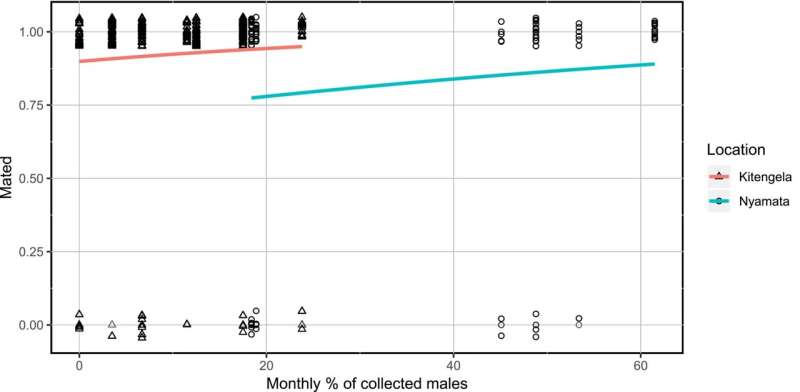This article has been reviewed according to Science X's editorial process and policies. Editors have highlighted the following attributes while ensuring the content's credibility:
fact-checked
peer-reviewed publication
trusted source
proofread
Female monarch butterflies have no problem breeding despite male shortage, finds study

Female monarch butterflies have no trouble finding a mate—even when a parasite kills most of the males, new research shows.
Some females carry a parasite called Spiroplasma that kills all their male offspring, meaning highly infected populations have very few males.
But the new study—by the universities of Exeter, Rwandaand Edinburgh, and the Dian Fossey Gorilla Fund—found females mated about 1.5 times on average, regardless of how many males were around.
The male proportion dropped below 10% in some cases, but it appears the remaining hard-working males managed to breed with most of the available females.
10-20% of females remained unmated, only slightly higher than the expected average in a population with plenty of males (5-10%).
"It was an inspiring and powerful experience working along with an international team of experts and advancing our knowledge of monarchs, which will shape my future career path towards research-based conservation," said first author Vincent Rutagarama, a student at the University of Rwanda.
Professor Richard ffrench-Constant, from the Centre for Ecology and Conservation on Exeter's Penryn Campus in Cornwall, said, "It seems that monarch butterflies are very good at finding each other and mating. The proportion of males in butterfly populations fluctuates through the year, but we found consistent evidence of female breeding success all year round."
Dr. Ian Gordon, of the University of Rwanda, said this breeding success might explain how the male-killing parasite can be successfully transmitted in a population where males are rare.
"The irony is that if the entire population was infected, monarch butterflies—also known as African queens—would produce no more princes, and the parasite would die out along with the butterflies," Dr. Gordon said.
"Further research is now needed, to find out why some monarch butterflies remain uninfected, and therefore able to produce healthy male offspring."
"Future research could also explain why the male-killing parasite is currently confined to a sub-section of the East African 'contact zone' (where prevailing winds converge, bringing flying insects together)."
Professor ffrench-Constant said other butterfly species have evolved resistance to parasites like Spiroplasma, so monarchs—which are very numerous and widespread—are unlikely to be at risk.
However, several years of severe drought in East Africa have caused a food crisis for humans and damaged biodiversity and ecosystems.
"We hope the monarch butterfly could become a symbol of conservation across Africa," Professor ffrench-Constant said.
"Monarchs live in savanna habitats. When there is rain, they thrive. When there is no rain, there are no butterflies, no cattle and no food for humans.
"The future of the monarch butterfly is tied to that of the continent, and humanity must tackle the climate and environment crisis to secure that future."
In butterflies and moths, successful breeding involves the transfer of a "spermatophore" from the male to the female. Spermatophores remain detectable after breeding.
In this study, carried out at one site in Rwanda and another in Kenya, male-female ratios were regularly counted and 10 randomly selected females were dissected each month to count spermatophores.
The paper was published in the journal Ecology and Evolution.
More information: Vincent P. Rutagarama et al, African Queens find mates when males are rare, Ecology and Evolution (2023). DOI: 10.1002/ece3.9956
Journal information: Ecology and Evolution
Provided by University of Exeter


















